NZ Skeptics Conference 2019
Haze Usmar - 1st February 2020
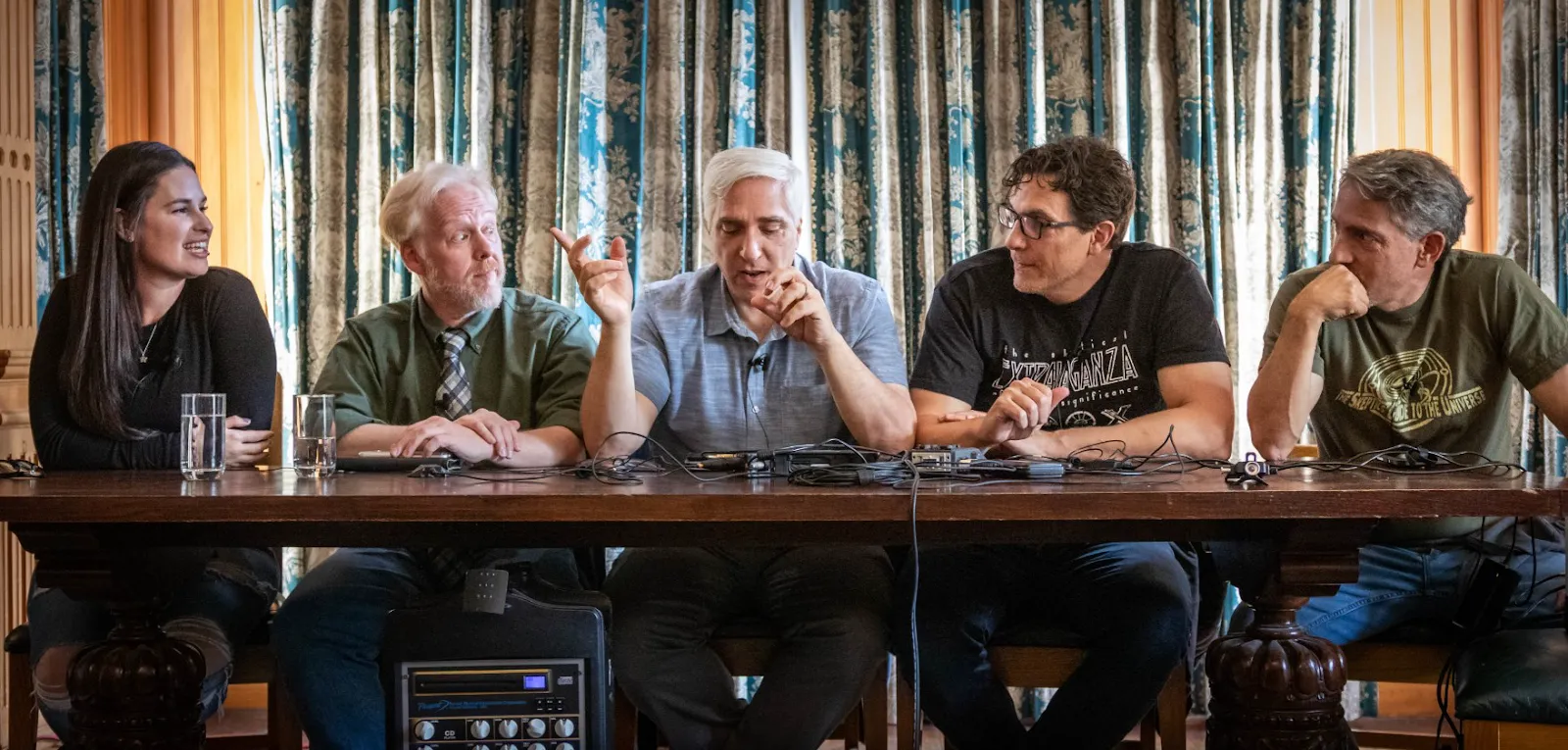
The SGU at Riccarton House—the private recording
The NZ Skeptics Conference 2019 was held over three days from 29th November in Christchurch and boasted some gorgeous venues (the historic Riccarton House and the Arts Centre’s Great Hall). We had a fantastic turnout with 154 attendees, and 10 very high calibre local and international speakers. Here is a summary to whet your appetite for 2020’s conference in Wellington.
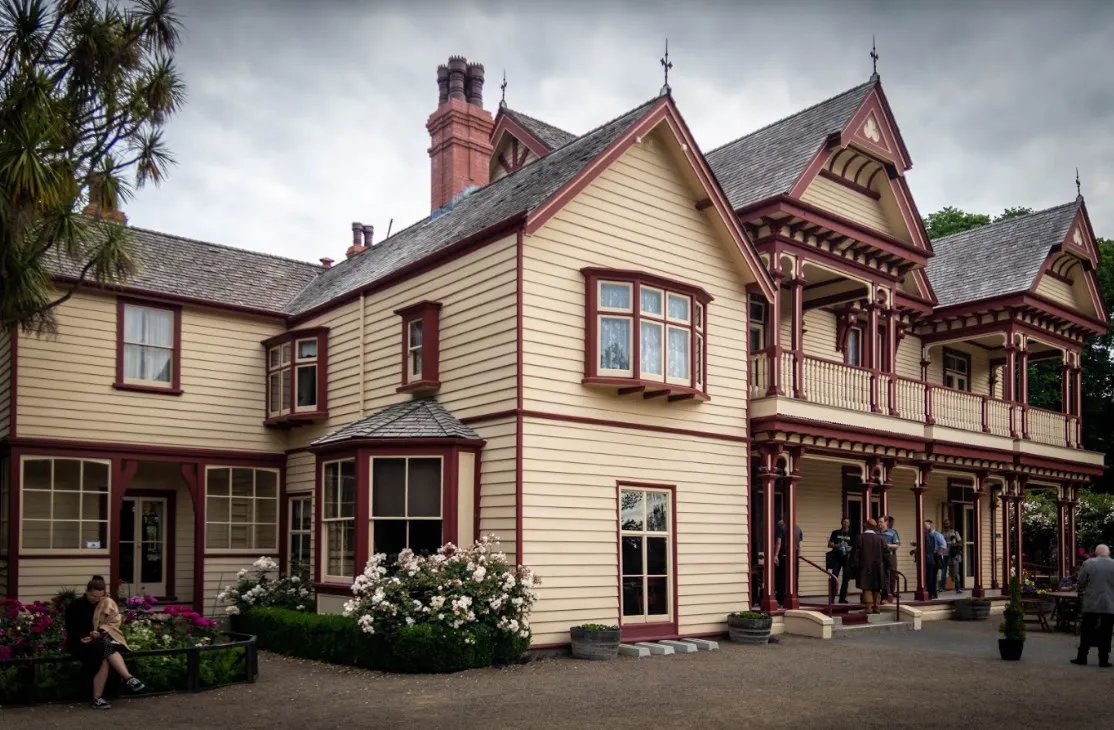
Riccarton House
Starting with a special private SGU podcast recording, things kicked off in earnest with the Friday night gathering and conference registrations at historic Riccarton House, including a bingo-style icebreaker game of “find someone who” organised by Jacinta Cording and Paul Ashton as an opportunity for guests to mix and mingle a bit.
Steven Novella
First up on Saturday, Steven Novella debunked a number of common “brain myths”:
- Phrenology is pseudoscience. Brain shape doesn’t determine skull shape, and the brain is more “networks of modules” than a collection of parts
- We don’t only use 10% of our brain. Rather, networks of neurons across the brain communicate, with less-used pathways ‘washed out’ as we age and more-used ones reinforced
- While the brain does have left and right sides, these don’t represent a clear logic/creative split as is often claimed. However, the left side controls physical movement and sensation for the right side of the body and vice versa
- Male and female brains are not different in size (other than male bodies tending to be larger overall), and studies claiming such a difference have not been replicable
- So-called ‘brain hacks’ and ‘brain training/games’ only really make you better at that particular task or game, and ‘Super Brain Yoga’ (squatting while holding opposite earlobes, supposedly to balance the two brain hemispheres) …is as nonsensical as it sounds.
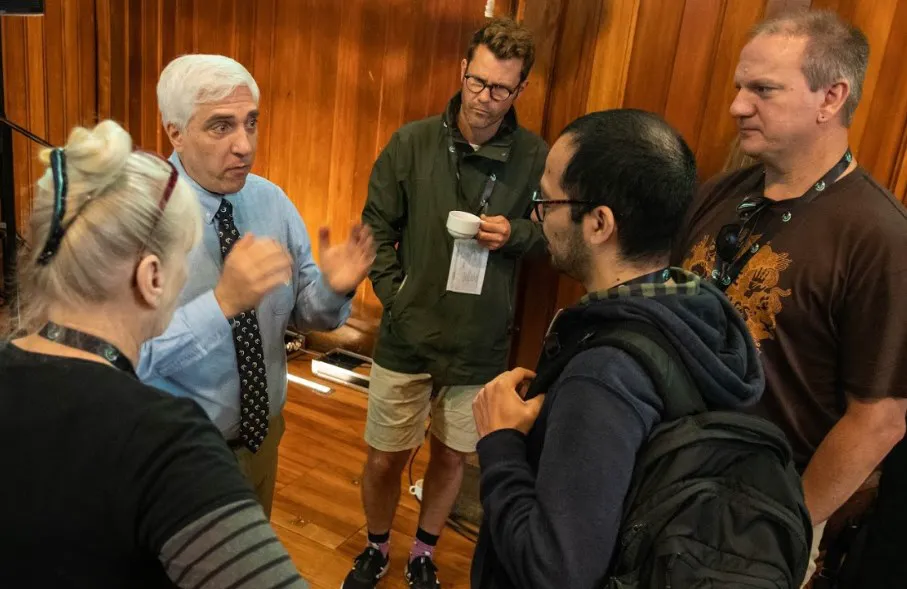
Steve Novella has a chat with conference attendees
Susan Gerbic
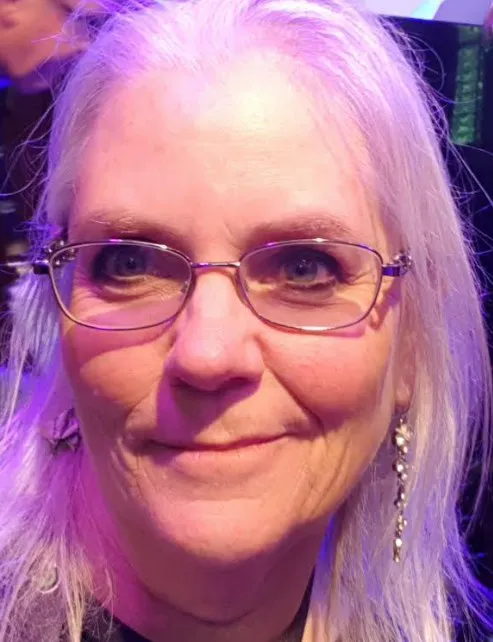
Susan Gerbic discussed “grief vampires” (so-called psychic mediums and their handlers) - referring to the harm they cause to vulnerable people, using tricks like cold reading - where they observe body language, appearance, speech, etc then make generalised ‘Barnum statements’ about the believer or the deceased; and hot reading - where they or their team research the believer beforehand and then use this often deeply personal information to fool them.
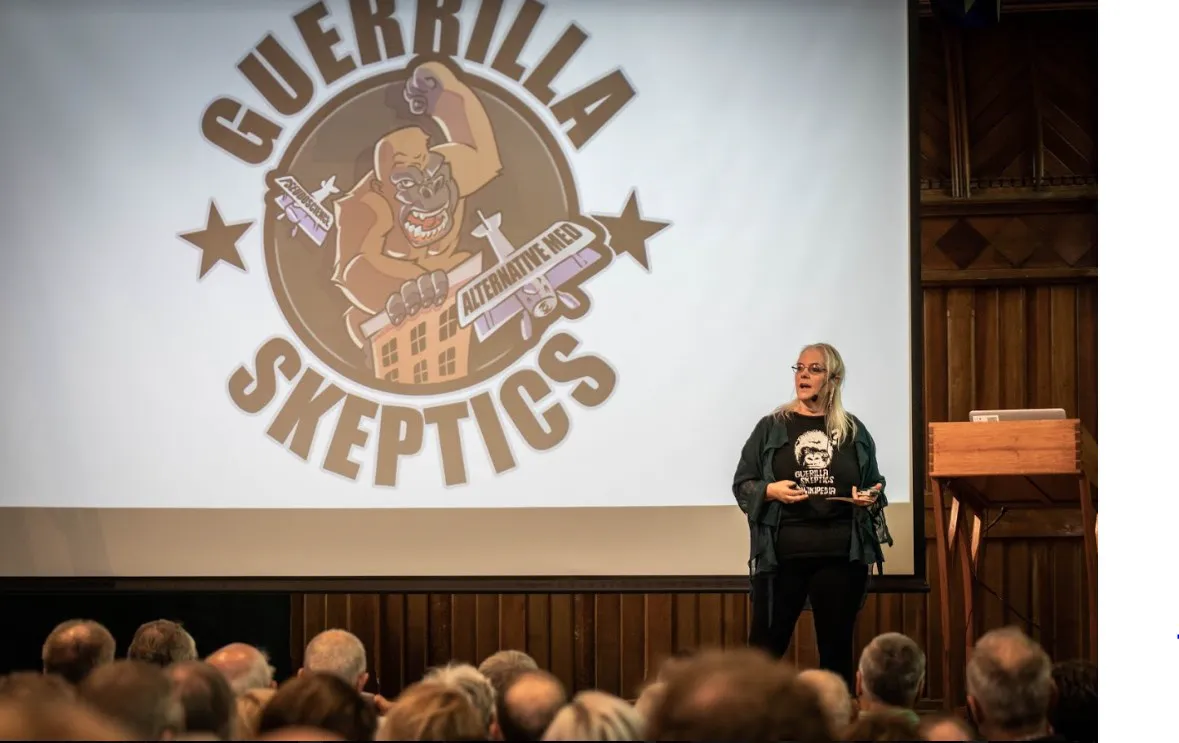
Believers are not stupid, Susan notes, but have been misled. She and her Guerrilla Skeptics of Wikipedia (GSoW) project work to expose grief vampires (including celebrity medium Thomas John and his TV show ‘Seatbelt Psychic’ (1)) through skeptical activism such as “Operation Pizza Roll”. GSoW’s team wrote, and maintain, 1,226 Wikipedia pages totalling 51 million views, including 7,000 views to the NZ Skeptics Wikipedia page.
Susan’s advice on “how to talk to gullible people”:
-
Be kind (and firm if they’re falling for something harmful)
-
Create shared ground - bring up things you both find silly e.g. Bigfoot, as a start point to talk about skeptical thinking
-
Take time to build trust - ask questions, listen, be respectful, e.g. “Really? I’ve heard that’s not real”. Let them save face.
Jacinta Cording
University of Canterbury forensic psychology lecturer Jacinta Cording taught us a few things about criminal profiling, risk assessment, and psychopathy, using examples from real-life cases.
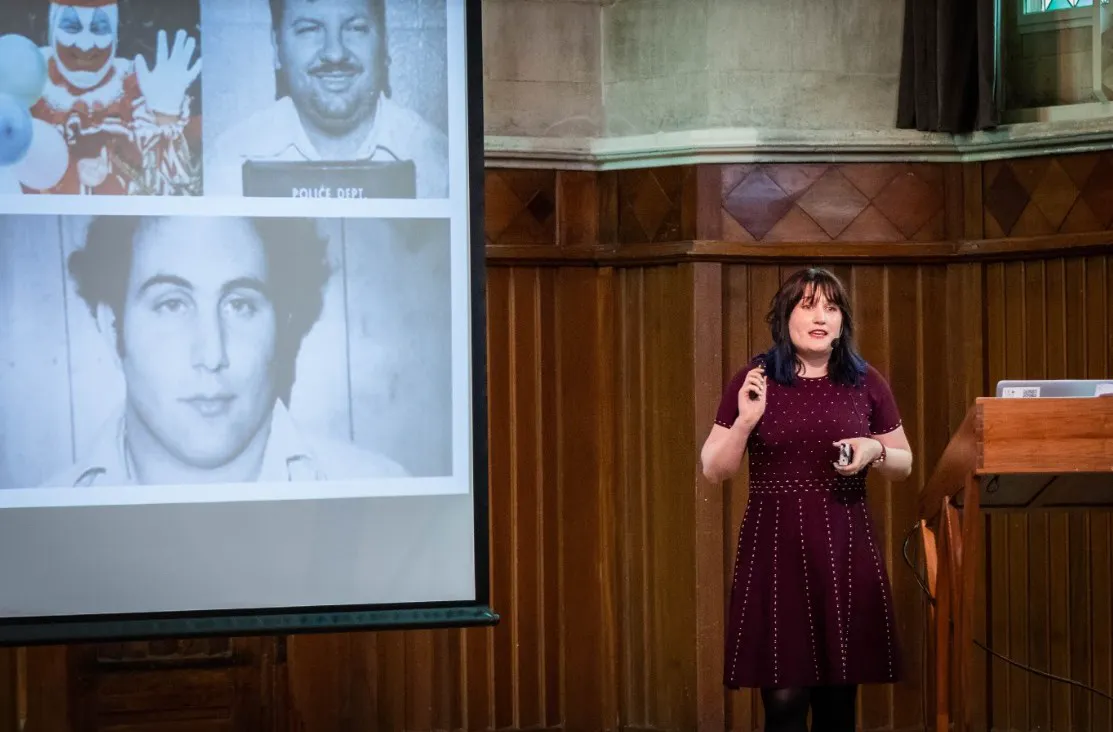
Because a criminal profile can only be confirmed correct once the criminal is caught, it can’t be reliably used to catch criminals and teaches us nothing about those who aren’t caught. Profiling can also be used to link related crimes after the fact. Interestingly, while 81% of police considered profiling useful, only 51% of predictions were confirmed, and just 2.7% of profiles led to the identification of an offender.
Jacinta recommended a nuanced approach to treatment of criminals to avoid negatively affecting rates of reoffending, noting risk assessment is only 50-60% accurate. She explained the biggest known risks for reoffending included youth, and having gang connections or antisocial associates. Ethnicity (once socioeconomic factors are controlled for) did not predict reoffending. Perhaps counterintuitively, nor did lack of empathy - which also did not predict psychopathy (not ‘sociopathy’ as pop culture calls it).
Mark Edward
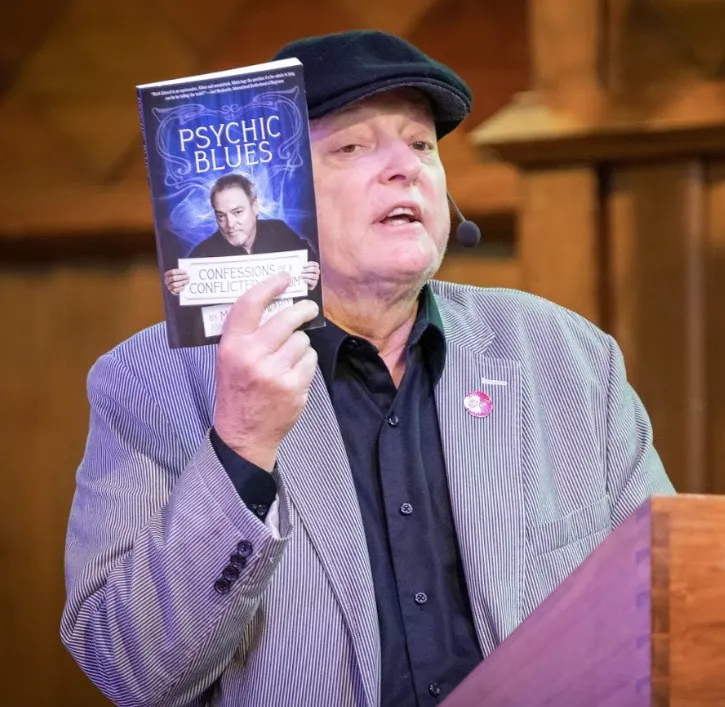
Former undercover psychic Mark Edward believes psychic reading lies somewhere between entertainment and fraud, having detailed his experiences in his book ‘Psychic Blues: Confessions of a Conflicted Medium’ (2). Quite the entertainer, he treated us to performances both in his own talk and at the sold-out Gala Dinner in the Great Hall. He never did explain how he was able to guess and match the unusual shape drawn on paper by a conference attendee, but he did explain how ‘psychics’ ply their craft, using tactics like Facebook searches, covert home visits by the psychic’s team, and available information like allocated seating data from venues (or name tags and an ice-breaker game at a skeptics conference!) to research potential targets.
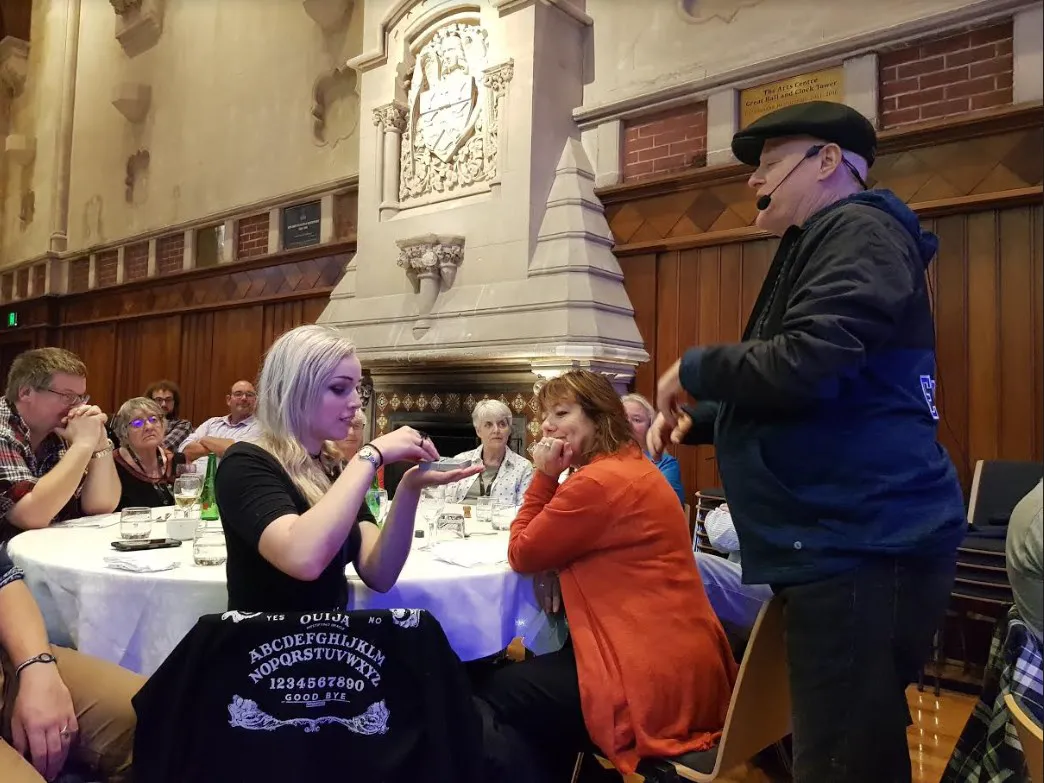
Mark Edward performs his magic with an audience member at the Gala Dinner at The Great Hall in CHCH.
Mark believes 95% of psychics know what they do is BS, 2.5% actually believe it themselves, and 2.5% are what he calls “intuitive and compassionate”.
In this “golden age of the con” he suggests we get off Facebook (or at least tighten our privacy settings), group up and do something about it - make information accessible and exciting to get kids into science. He also hinted that “something big is coming” in the form of a psychic exposé… stay tuned!
Maree Hackett
Program Head of Mental Health at The George Institute for Global Health in Australia, Maree Hackett gave a very informative lecture on the importance of language in mental health assessment, and kindness in general, illustrating this both with her own artwork (3) and with examples from a large study of depression in Aboriginal and Torres Strait Islanders. She showed how language choices were pivotal in making this study meaningful and accessible to this diverse population comprising speakers of some 250 languages.
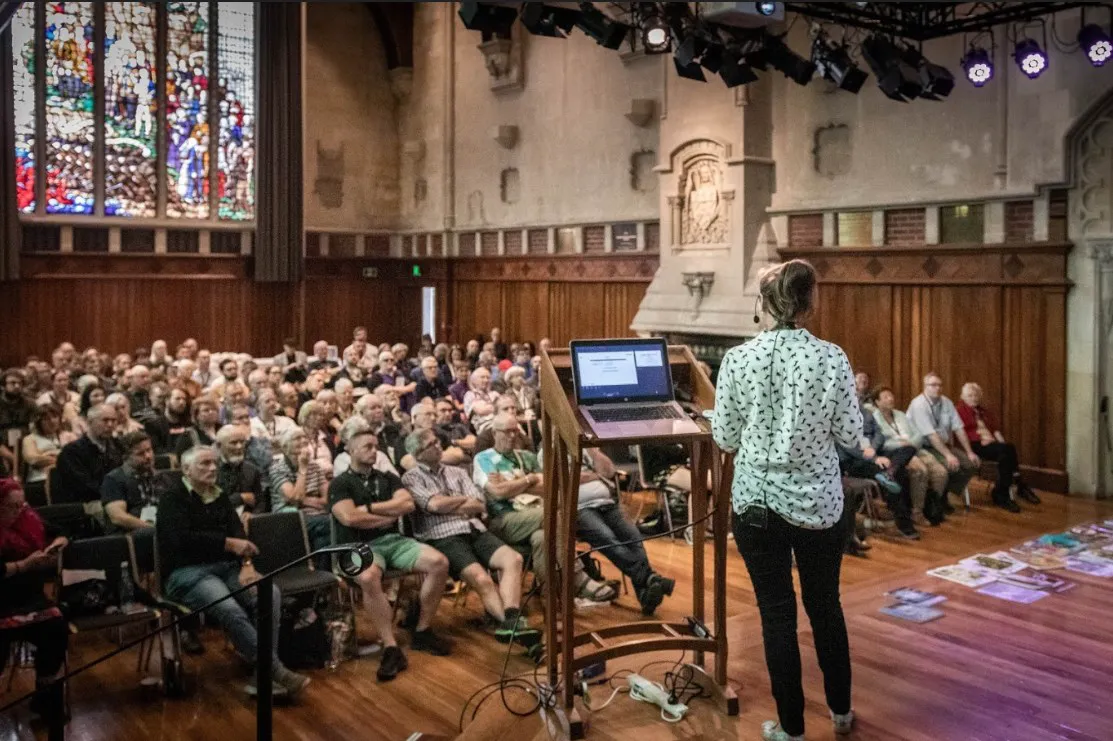
Often branded ‘political correctness’, careful use of language helps avoid causing harm to vulnerable populations and can make complex ideas more understandable. Maree said we can help someone with depression by being non-judgemental and really listening, and using ‘person-first language’ such as ‘person with depression’ instead of archaic, stigmatising terms like ‘depressive’, ‘crazy’, ‘psycho’, or ‘insane’ - some of which have clinical definitions - as these trivialise the experiences of people who are really suffering.
Gala Dinner
After talks wrapped up, and the AGM was out of the way, guests were free to explore the city before the Gala Dinner - a jovial occasion with delicious food, great entertainment provided by Mark Edward, and the Warren Zevon-esque vocals of Invercargill-based singer-songwriter and skeptic Brad McClure accompanied by NZ Skeptics Chair Craig Shearer on piano and backing vocals. Check out a skeptically-inclined sample of Brad’s work here: (4).
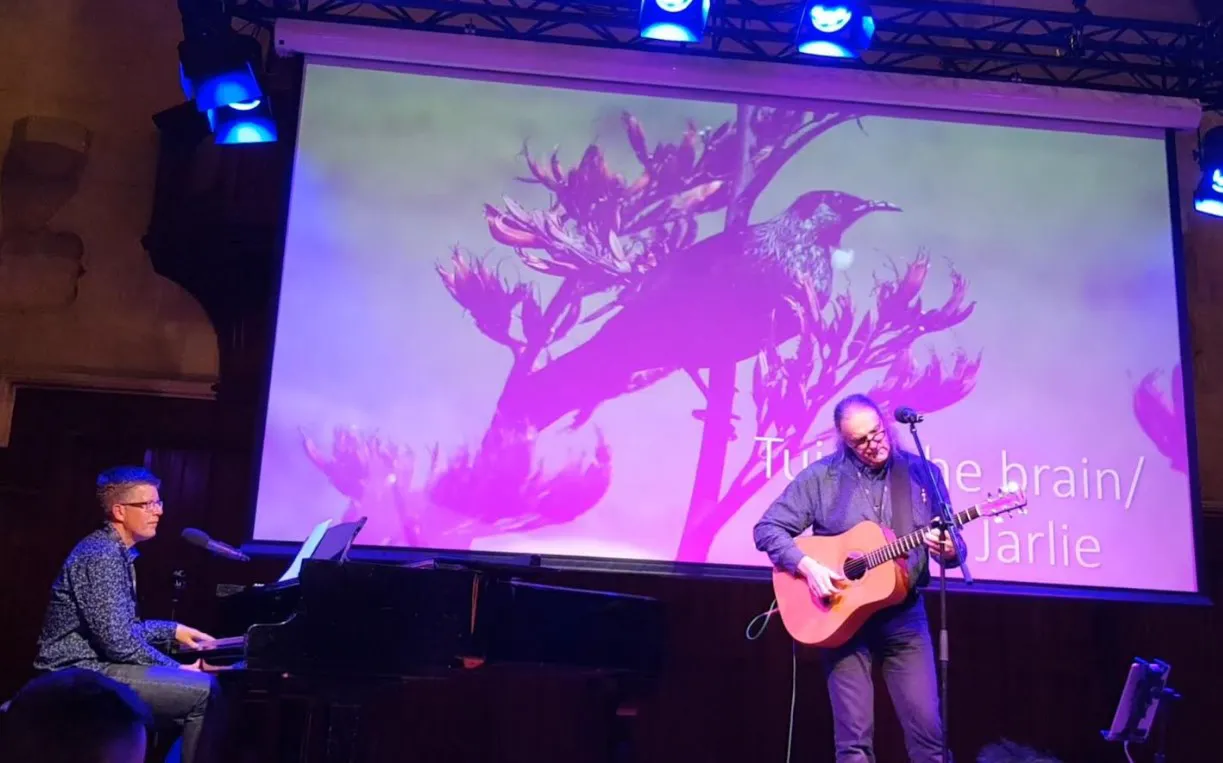
Brad MacClure performing his own songs with Craig Shearer on piano
The NZ Skeptics’ annual prize-giving also took place at the dinner—refer to pages 6 & 7 for details! Our first ever Lifetime Membership Award went to Vicki Hyde for her work and achievements over the years for the NZ skeptical community.
SGU Podcast
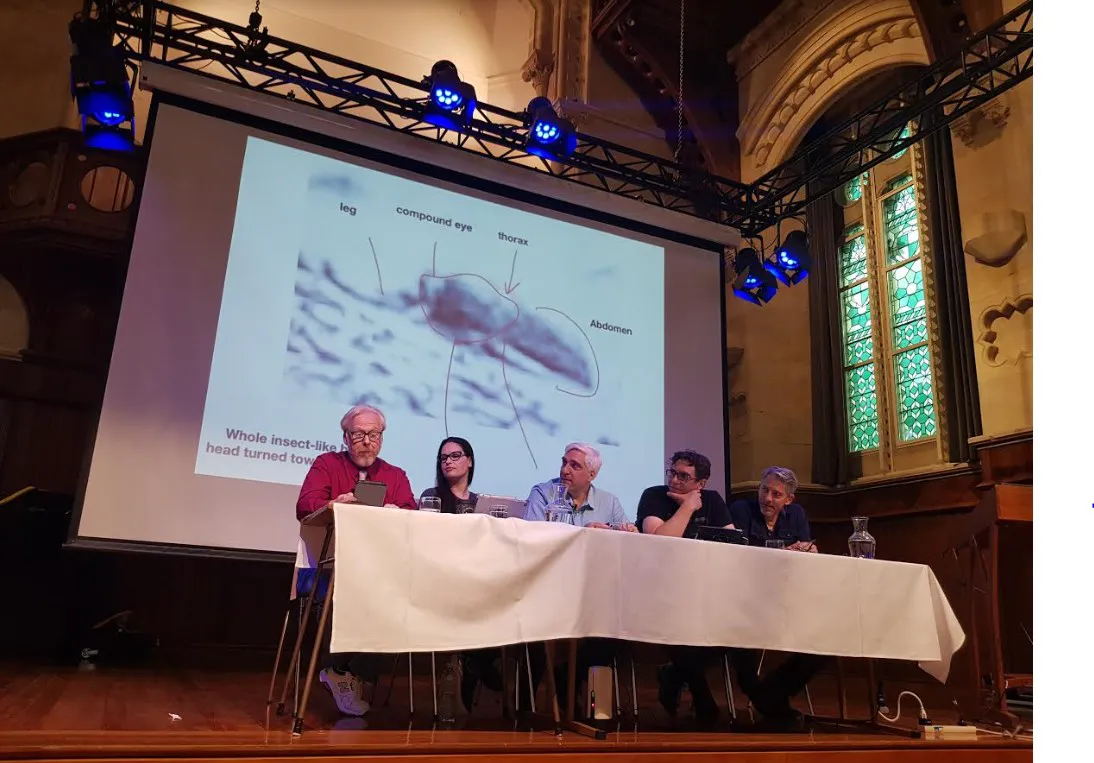
Starting our Sunday programme, and a highlight this year, was the Skeptics’ Guide to the Universe (SGU) Podcast, recorded with a live audience at the Great Hall. The team spoke highly of their time in NZ, having visited the Nishimura Telescope in Tekapo and enjoyed “the best butter and coffee” here. No spoilers, but this was a banger of an episode as usual, spanning topics such as the place on earth with NO life, floating metal, giant alien bugs on Mars, trauma, climate tipping points, and the resulting chaos when legislation forges ahead without science. It also featured a very entertaining audience-participation version of popular SGU segment ‘Science Or Fiction?’ - theme: hybrid animals.
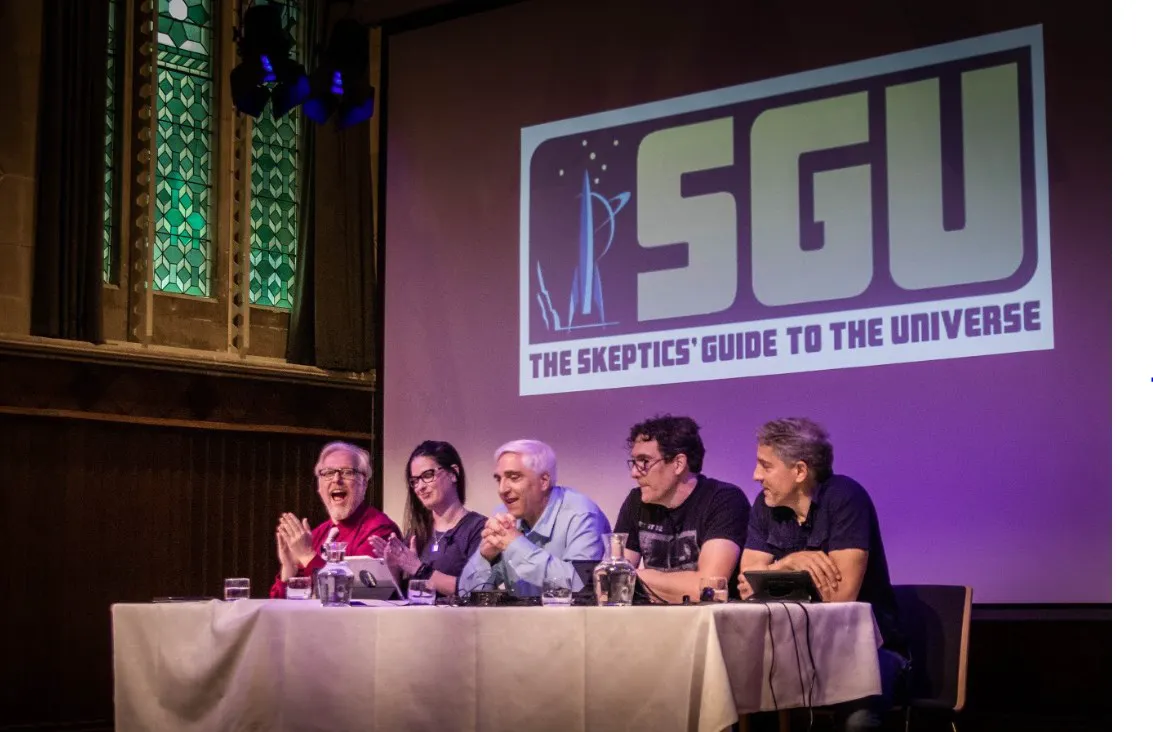
Check out SGU episode 753 on Spotify: (5).
Cara Santa Maria
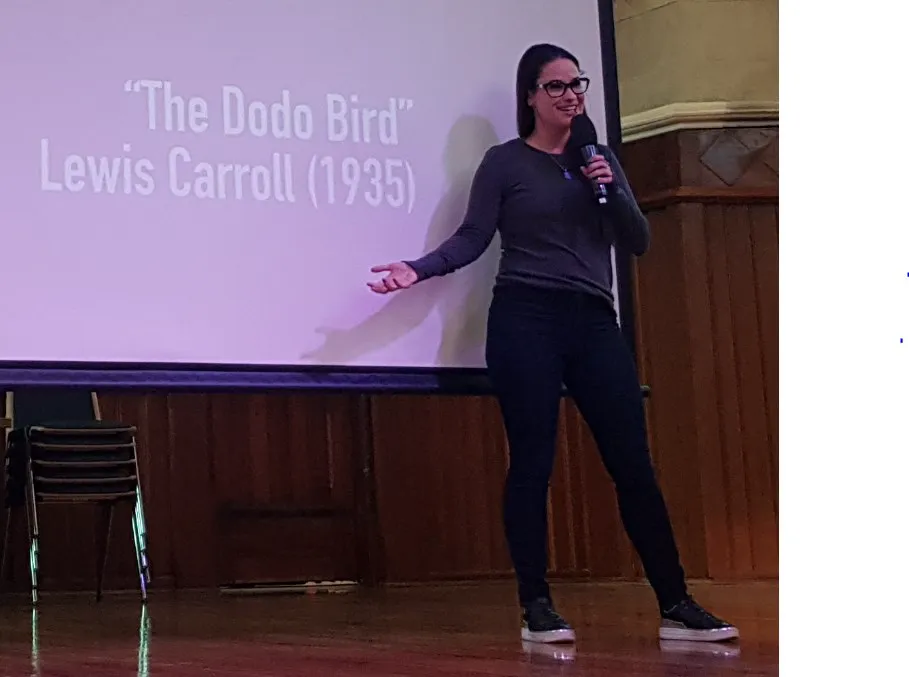
SGU panelist, renowned skeptic and existential psychologist Cara Santa Maria has worn many labels in her life-time - including ‘Mormon’ and ‘cheerleader’. Her later shift “from firebrand atheism to gentle skepticism” came as she grew to understand more of human nature through her own life experience and her study of clinical psychology. Is psychology even a science? According to Cara, “Evidence is squishy”, with common factors such as empathy, non-judgement, a sense of relationship, and “treatments that are actual therapies” accounting for most positive outcomes.
She notes that being a skeptic is a privileged position requiring a level of education, and some reasons for alternative ways of thinking include confirmation bias, selective reporting, and the somewhat plastic nature of memory.
When talking to non-skeptics, Cara encourages skeptics to:
• be genuine and cultivate the skill of empathy
• know your audience and desired outcome
• don’t oversimplify, but keep the language simple
• focus on how rather than what to think
• meet people where they are (e.g. start climate graph at 6,000yrs ago when talking to Creationists), and
• “don’t be a pedant (dick)”.
David Wiltshire
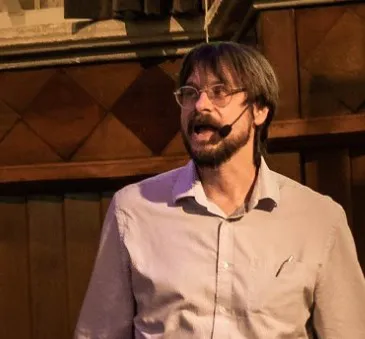
David Wiltshire, Professor of Theoretical Physics at the University of Canterbury gave a talk entitled “What is the Universe made of?” He spoke about the shape and expansion of the universe and problems with current models, particularly the interpretation of measurements in cosmology. Expanding on Einstein’s General Relativity work, David notes that our ‘lumpy universe’ seems to have a different age (17 billion years instead of 14) when viewed from a lower gravitational field area such as an intergalactic void, due to time running slower in stronger gravitational fields. Currently ‘dark energy’ is proposed as a theoretical explanation for the apparent accelerating expansion of our universe. But if current data is updated to include corrections for General Relativity, it may explain this apparent acceleration, essentially removing the need for dark energy to explain the observations. David says in ten years we will know if his theories are correct, so… “watch this space” (sorry, couldn’t resist!)
Panel Discussion
Last up on Sunday was a lively panel discussion featuring NZ Skeptics’ Media liaison Mark Honeychurch, and conference speakers Susan Gerbic, Steven Novella, Cara Santa Maria, and Jay Novella. Highlights included some tips on how to be a skeptic (give a climate denier a science book!), differing experiences from the panel’s female participants on the treatment of women in skepticism, and the concept of skeptical community. Summarising, Steven Novella commented that we as skeptics are like the immune system and must remain “eternally vigilant”.
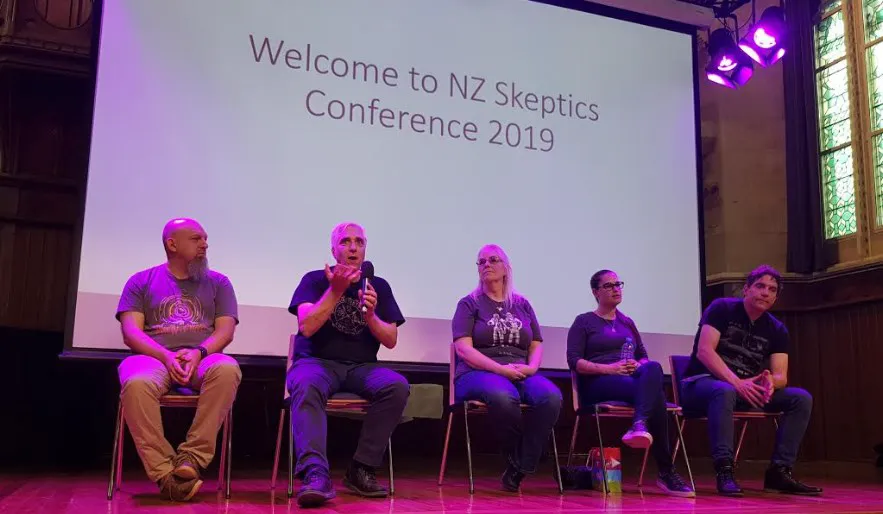
Mark Honeychurch, Steven Novella, Susan Gerbic, Cara Santa Maria, Jay Novella
Special thanks to our fearless MC Siouxsie Wiles MNZM, and Jonny Grady who again provided sound tech services.
We hope to see even more of you at the 2020 conference in Wellington!
Links:
(1) Secret Sting to Expose Psychics https://tinyurl.com/y6yjs4kj
(2) Psychic Blues: Confessions of a Conflicted Medium https://feralhouse.com/psychic-blues/
(3) Maree Hackett on Instagram https://www.instagram.com/mareazles/
(4) Songs by Brad MacClure https://tinyurl.com/qsdbfnq
(5) SGU Episode recorded at the conference https://tinyurl.com/tlehggt